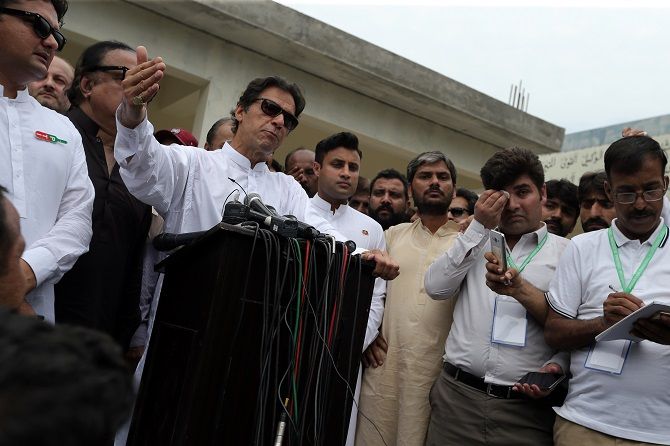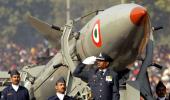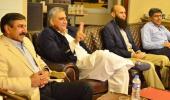'Against the backdrop of difficult administrative, political and economic problems, Imran's temperament and staying power will be the subject of intense expectation and public scrutiny,' says Rana Banerji, who headed the Pakistan Desk at the Research and Analysis Wing, India's external intelligence agency.

Armed with a fairly comfortable mandate, youth expectations of nepotism/corruption-free governance and army support, Pakistan Tehrik e Insaf leader Imran Khan nevertheless faces formidable political and economic challenges to convert his promise of Naya Pakistan into a stable, democratic and functioning State.
To begin with, Imran may start with the advantage of having a temporary respite from the chronic instability of civil-military dissonance which has plagued every recent civilian government in Pakistan.
The military obviously wanted a civilian façade and an elected government which would follow its dictates.
The outcome of the 2018 election suits the generals to a 'T', with their protégé left just short of near majorities, both at the Centre and in Punjab, yet able to form governments, after horse-trading with Independents and turncoats.
The honeymoon may last as long as Imran does not venture on independent foreign policy initiatives pertaining to India, Afghanistan and the United States.
He is unlikely to display any alacrity on these subjects though he may appear, in the English media, as a better communicator making amenable noises compared to his immediate predecessors.
His first problem will be to lower the atmosphere of intense polarisation in the political diatribe which built up to the 2018 election, ever since his dogged pursuit of the anti-corruption agenda against the Sharifs.
Though he has spoken about desisting from victimisation, immediate pre-election rhetoric may inhibit him from following a too benevolent or statesman-like an approach in this regard. He may prefer, instead, to allow the law to take its course.
It remains to be seen if the higher courts in Pakistan now play a more even-handed role, so that justice is not only done but seen to be done.
A former prime minister sitting in jail, with his narrative of victimhood not having been totally rejected by the mandate, especially in Punjab, cannot be a factor of comfort either for the army or Prime Minister Imran Khan.
A way would have to be found to douse the antipathy of an injured Pakistan Muslim League-Nawaz leadership, with Nawaz and Maryam eventually allowed bail, so that the new regime can get on with tasks of governance.
Pressures from a strong -- even combined -- Opposition in the national assembly, and in Punjab, if he is able to form a government there, would need to be tackled with finesse.
The Muttahida Majlis e Amal of the religious parties has not accepted the poll and threatened street agitations though unanimity escaped deliberations in the all parties conference on July 27.
The Pakistan Peoples Party has said it will sit in the Opposition in the national assembly.
PML-Nawaz leader Shahbaz Sharif has sought time to decide, but many senior party leaders favoured this option.
Reviving the process of working with a strong Opposition in a strong parliament can only be a desired but difficult objective.
Cabinet formation and choosing an acceptable politician to head the provincial government in Punjab can cause a few minor glitches.
Senior PTI leader Shah Mehmood Quereshi went public on not wanting to be foreign minister again, preferring to throw in his hat for the post of Punjab chief minister.
While he won his Multan seat for the national assembly, he lost from PP-127 in the Punjab provincial assembly.
Pervez Khattak, chief minister of the Khyber Pakhtunkhwa (Kpk), is credited for the resounding mandate from the province, historically bucking anti-incumbency. He prefers to stay on as CM, Kpk, but there are reports that Imran may want him at his side as a loyal, trusted, interior minister.
The mercurial Shireen Mazari is being mentioned for defence. Known to be anti-Indian and anti- American, she may yet be seen as somewhat unpalatable for both the army and Pakistan's Western benefactors.
Asad Omar, former chief executive of Engro, Pakistan's biggest conglomerate, is likely to become finance minister. Chaudhry Sarwar, a recent returnee from the UK, also features as a contender for this portfolio.
President Mamnoon Hussain's term ends on September 9, 2018. This would barely give Imran's senior party managers enough time to home in on an acceptable/suitable (read pro-PTI) distinguished persona for this prestigious post.
Gubernatorial appointments follow. The PML-N appointed Sindh Governor Muhammad Zubair -- though he is Asad Omar's brother -- has already announced his resignation. The other three governors may follow suit.
While this may provide some leeway to accommodate disgruntled party aspirants, Imran's mandate may dictate the need to find eminent, impartial, appointees with a proven record of public service instead of party loyalists to fill these slots.
Much is made about the emergent contradictions between Imran's professed agenda of reform and his complicated re-engagement with religion, not least in his personal life.
In the past, Imran opposed military action against the Tehrik-e Taliban, but changed his line after the Peshawar army school attack on December 16, 2014.
This time, to counter the MMA, he sided with the Akora Khattak seminary's Maulana Samiul Haq (Jamiat-e Ulema Islam, JuI-S). Maulana Fazlur Rehman Khalil of the Harkat ul Islami has also announced support for Imran.
Though the army blessed the mainstreamed religious fundamentalists of Muhammed Saeed's Jamaat ud Daawah contesting under the Allah Hu Akbar Tehrik platform, they did not do too well in the Punjab vote.
The Tehrik e Labaik Ya Rasool did better with its Barelvi support, winning three seats in provincial assemblies, two in Sindh and one in Kpk.
As PTI satraps settle into governance in the provinces, it will be interesting to observe how they deal with sensitive sectarian issues like Khatme Nabuwat, which can crop up unexpectedly in the political discourse.
Also, what would be the PTI's response to the army's continuing Radd ul Fassad operations, especially (if any) inside Punjab ?
Imran will inherit an economy in crisis.
Though growing at 5.8 percent -- the fastest pace in 13 years -- pressures on Pakistan's current account show no signs of abating.
Gross Domestic Product is forecast to rise by 6%, yet there is a vicious debt trap to be surmounted.
So far, Pakistan has met its debt servicing requirements only by borrowing more.
Pakistan's current account deficit widened 43% to $18 billion in the fiscal year ending June 2018 while the fiscal deficit ballooned to 68%.
Pakistan's central bank devalued the rupee four times since December, weakening it by more than 20%, amid efforts to avert a balance of payments crisis in the $305 billion economy.
Its foreign reserves are dwindling and plunged to just over $9 billion last week from $16.4 billion in May 2017.
All these issues will figure in the next painful round of negotiations with the International Monetary Fund, which Pakistan will perforce have to enter.
The IMF will likely insist not only on structural reforms, but at the least, on measures requiring spending cuts to reduce the fiscal deficit, which could imperil Imran's populist promises to improve the state of the country's schools and hospitals used by the masses.
Pakistan imports about 80 percent of its oil needs. Electricity economics has also caused persistent headaches because it was being sold at a price lower than the cost it was generated. Circular debts were written off in the past, but proved to be temporary relief.
With the Chinese coming in a major way -- via the China Pakistan Economic Corridor power projects -- but not being very benevolent in allowing deferred payments for their loans -- this problem may not be easily resolved, especially if the law and order situation and the investment climate do not improve due to the persistent impact of terrorism, extortion, kidnapping crimes.
On his campaign trail, Imran repeatedly castigated Pakistan's culture of tax evasion.
Only 1% of the population pay income tax. Many loopholes exist, which have enabled the rural rich and corporate big wigs to evade the tax net. Increasing that figure would be a major achievement.
Imran has vowed to reform the Federal Bureau of Revenue in his first six months in office. This could be a tall order.
Gimmicks like not occupying government buildings like the PM/governor houses or converting these to public places may not help.
Another immediate focus will be on reforming State giants such as Pakistan International Airlines and various power utilities, which the previous government struggled to privatise.
Imran has also promised to step up an anti-corruption drive, though this risks triggering capital flight in a country where vast wealth is undocumented and a parallel black economy continues to prosper.
Over-zealous measures could ruffle the feathers of Pakistan's 'MilBus' -- the sector catering almost exclusively to the greed of retired generals.
Against this backdrop of difficult administrative, political and economic problems, Imran's temperament and staying power will be the subject of intense expectation and public scrutiny.
The military leadership's obsession with India, its continuing support of jihadi terrorism and international isolation resulting from these policies may prove obstacles on Imran Khan's path, seriously inhibiting his capacity to substantially alter the country's progress as a troubled State in the short term.











 © 2025
© 2025